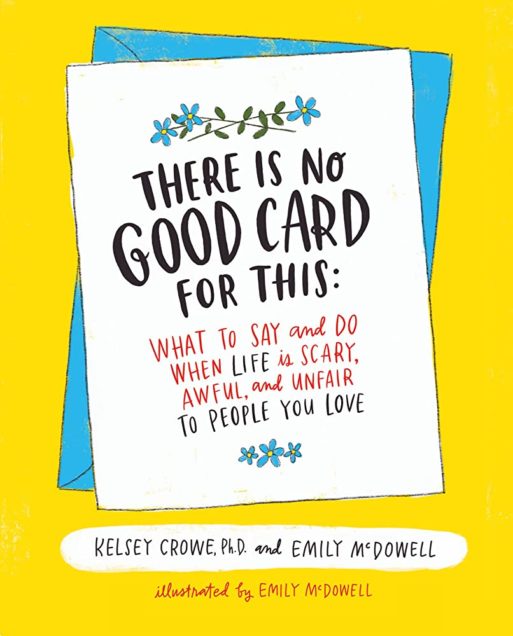 “There Is No Good Card for This: What to Say and Do When LIfe is Scary, Awful, and Unfair to People You Love” is a gem of a book by Dr. Kelsey Crowe and Emily McDowell. It’s a step-by-step, illustrated guide that takes you past the paralysis that often sets in when you’re confronted with the suffering of someone you care about and helps you figure out what you can actually do to be helpful. Crowe and McDowell start from the premise that “because you graduated from kindergarten, you already know that empathy and compassion are important, and being a helpful friend is a good way to be.” They also assure you that no one expects you to become the perfect provider of support. They just want you to know that there are concrete ways of being helpful to someone having a rough time. And it’s their mission to aid you in figuring out what those ways are. They want to help you “move past just thinking about a suffering person, to actually doing something (even a small thing) if the situation calls for it, and doing it with confidence instead of fear of what could go wrong.”
“There Is No Good Card for This: What to Say and Do When LIfe is Scary, Awful, and Unfair to People You Love” is a gem of a book by Dr. Kelsey Crowe and Emily McDowell. It’s a step-by-step, illustrated guide that takes you past the paralysis that often sets in when you’re confronted with the suffering of someone you care about and helps you figure out what you can actually do to be helpful. Crowe and McDowell start from the premise that “because you graduated from kindergarten, you already know that empathy and compassion are important, and being a helpful friend is a good way to be.” They also assure you that no one expects you to become the perfect provider of support. They just want you to know that there are concrete ways of being helpful to someone having a rough time. And it’s their mission to aid you in figuring out what those ways are. They want to help you “move past just thinking about a suffering person, to actually doing something (even a small thing) if the situation calls for it, and doing it with confidence instead of fear of what could go wrong.”
Part one of “There Is No Good Card for This” is called “Laying Some Groundwork,” and it offers thoughts and reflections on some of the reasons we have difficulty connecting in times of suffering. And it shows us how we can break through those psychological roadblocks to actually show up for other people. In the first chapter, “Put Your Own Oxygen Mask On First,” the authors lay out a few short exercises to help you look at what makes you shy away from reaching out: fear of doing the wrong thing; fear of saying the wrong thing; fear of not having the time or bandwitdh. These include some self-forgiveness exercises that ask you to reflect on times that you’ve been unable to show up, as well as exercises asking you to remember times that you’ve received support in hard moments. “The more we can appreciate the small gifts that we receive, the more we can appreciate the small gifts that we offer,” Crowe and McDowell say.

Credit: northcountrypublicradio.org
After the groundwork of self reflection, part two of the book looks at “The Three Touchstones of Showing up.” The first of these is kindness. This chapter gives a succinct explanation of compassion and empathy and the difference between the two. It explains how empathy can be a useful mental tool for developing greater compassion and what emotional resonance is. The authors remind us that pity is NOT compassion, and that “the greatest comfort comes when we’re able to climb down into the ‘well of suffering’ with a fellow human being.”
The second touchstone of showing up, according to Crowe and McDowell, is listening. In this chapter, they emphasize the importance of learning to shut up with a helpful comic strip that asks, “What Kind of Nonlistener Are You?” featuring “The Sage,” “The Optimist,” “The Doomsayer,” “The Epidemiologist” and “The All About Me.” They explain that empathetic listening is the most valuable kind of listening for someone who is suffering. Then they provide concrete tips on how to provide it.
The last touchstone of showing up is making small gestures. Here the authors give us “The Empathy Menu” that suggests small yet specific gestures you can make towards someone who’s suffering. These range from doing yard work to sending texts, to helping out with extra costs. They even provide suggestions for different personality types.

Credit: emilymcdowell.com
Part three of “There is No Good Card for This” includes a section on knee-jerk responses to avoid. These include comparing our own situation to the person we’re attempting to support; offering up theories to explain the person’s misfortune; and sharing worst-case scenario stories. It ends with a simple “Empathy Cheat Sheet of Dos and Donts,” for the moments when you’re overwhelmed in the face of someone’s pain. The cheat sheet is organized so that you can reference specific situations: unemployment, fertility struggles and miscarriages, chronic illness, etc. It’s simple; it’s elegant, and it’s super helpful.
The greatest strength of “There Is No Card For This” is its simplicity. Deep pain and suffering are overwhelming for those experiencing it and for those that want to provide support. And the fact that the information is presented simply does not mean it’s not well researched, because it is. Reading it, we get the sense that we’re in very competent hands–and we are. Both authors are cancer survivors who draw on their personal experiences and professional expertise to create a guide that makes being supportive seem really, really doable.

 There Is No Good Card For This: What To Say And Do When Life Is Scary, Awful and Unfair To People You Love, by Kelsey Crowe and Emily McDowell
There Is No Good Card For This: What To Say And Do When Life Is Scary, Awful and Unfair To People You Love, by Kelsey Crowe and Emily McDowell


 The Spiritual Symbolism of Cardinals
The Spiritual Symbolism of Cardinals
 Meaning-Focused Grief Therapy: Imaginal Dialogues with the Deceased
Meaning-Focused Grief Therapy: Imaginal Dialogues with the Deceased
 Flawed Kidney Function Test Discriminated Against Black Patients
Flawed Kidney Function Test Discriminated Against Black Patients














